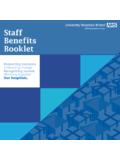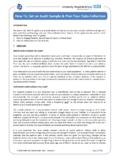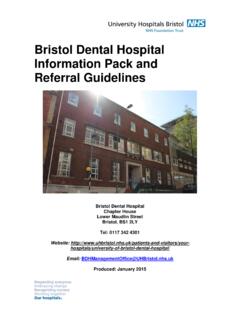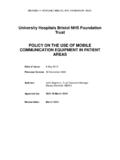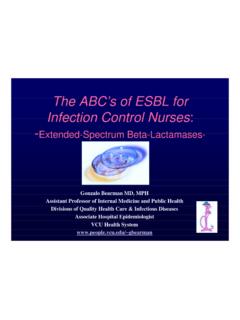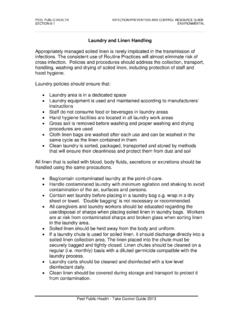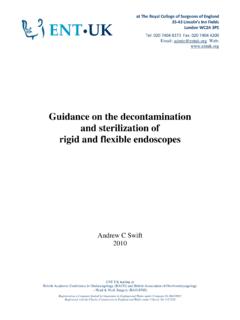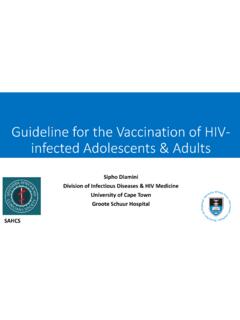Transcription of MRSA Screening Policy and Protocol
1 MRSA Screening Policy and Protocol Author: Christine Perry/Carly Hall Approved by: Infection control Committee Date of issue: March 2009 Date for review: March 2010 Chief Executive Ratification: 2 Contents 1 Introduction Page 3 2 University Hospitals Bristol NHS Foundation Trust MRSA Screening Criteria Page 3 3 Management of MRSA Screening Process Page 4 4 Governance and Assurance Page 9 5 References and Bibliography Page 10 Appendix 1
2 UBHT MRSA Screening Leaflet for Patients/Carers Appendix 2 Procedures for an MRSA Screen 3 1. Policy STATEMENT AND PURPOSE University Hospitals Bristol NHS Foundation Trust will comply with national requirements, guidance and current best practice in MRSA Screening processes. This document sets out the MRSA Screening Protocol for use in the University Hospitals Bristol NHS Foundation Trust. It is based on current national guidance and an assessment of local MRSA epidemiology, and will be revised accordingly to accommodate the national requirement for MRSA Screening of all admissions by 2011.
3 The document sets out the minimum Screening requirements and does not preclude clinical judgement in Screening for MRSA in patients not included in identified risk groups. The principle objectives of Screening for MRSA are: 1. To identify patients who are carriers1 of MRSA 2. To subsequently manage the care of MRSA positive patients to reduce the risk of them developing infection 3. To reduce the risk of transmission of MRSA to other patients. In addition to the overall Protocol , guidance specific to individual areas of the Trust is given within this document.
4 2. UNIVERSITY HOSPITALS BRISTOL NHS FOUNDATION TRUST MRSA Screening CRITERIA Group Rationale All adult in-patient elective pre-operative surgery (BRI, St Michael s, BEH) including day surgery with the exceptions of: Day case ophthalmology Day case dental Day case endoscopy Minor dermatological procedures Termination of pregnancy Covers all high risk groups and surgical patients who are at greatest risk from MRSA infection.
5 National requirement All patients admitted to ICUs and HDUs (including Cardiac ICU,HDU, Paediatric ICU, Neonatal ICU, Respiratory High Care, Hepatology High Care) with weekly ongoing Screening Covers all areas of the Trust where patients are at high risk from MRSA infection All adult and paediatric patients pre-Oncology/BMT/Haematology and on 6th attendance as outpatient treatment All patients admitted to wards 61 and 62 Covers high risk groups, particularly those that could have long-term intravenous lines All emergency adult trauma patients Protects elective surgical orthopaedic patients All planned admissions to Ward 37 (BRCH)
6 And all children commenced on a dialysis programme Covers a high risk group. All paediatric surgical high risk patients Covers paediatric surgery with greatest 1 A patient who is an MRSA carrier has the bacterium present on their body but does not have any signs or symptoms of infection. 4 risk of MRSA.
7 In line with adult Policy and with current UBHT Policy Paediatric patients starting home ventilation Group at high risk of acquiring MRSA colonisation Previous MRSA positive patients High risk group for bacteraemia and transmission to other patients Patients transferred from other hospitals and from abroad Identifies patients who may have become colonised/infected prior to UBHT admission Emergency surgical and medical patients who have been in-patients within the last 6 months Identifies most patients who will be at highest risk of MRSA carriage Emergency medical and surgical patients: From Nursing and Care Homes who have risk factors of wounds or an indwelling device ( urinary catheter) Who are Healthcare Workers Who are intravenous drug users Identifies most patients who will be at highest risk of MRSA carriage Obstetric patients.
8 Whose babies are likely to need neonatal surgery or be in Neonatal ICU Intravenous drug users Identifies those patients most likely to be at highest risk of MRSA carriage or at risk from MRSA infection on local risk assessment Patients transferred between hospitals within UHBristol ( to BGH or BRI to St Michaels) Identifies those patients most likely to be at highest risk of MRSA carriage or at risk from MRSA infection on local risk assessment All Long stay patients All patients who have been in-patients for over 30 days must have a full screen if they have not been screened for other reasons.
9 This should be repeated every 30 days whilst they remain inpatients Identifies those patients most likely to be at highest risk of MRSA carriage or at risk from MRSA infection on local risk assessment 3. MANAGEMENT OF MRSA Screening PROCESS Adult Surgical Patients Timing of screens Elective surgical patients Patients will normally be screened for MRSA at pre-operative assessment clinic. If the pre-operative assessment takes place more than 2 weeks before surgery the MRSA screen can be taken but patients who have screened negative for MRSA are to be contacted 2 weeks before surgery by the to review risk for MRSA.
10 For patients undergoing elective surgery who are not attending pre-operative assessment clinic an MRSA screen 2 weeks prior to surgery is to be arranged via the 5 local primary care team. Patients who are transferred directly from other in-patient providers for elective surgery are to be screened on transfer into UHBristol facilities. The transferring facility is also requested to undertake an MRSA screen when the request to transfer is made. Patients undergoing elective fast track surgery are to be screened at the point of decision to admit.

